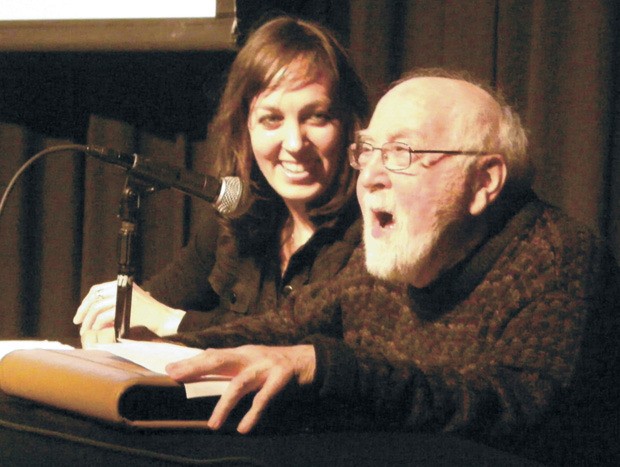I don’t like to trot out this word, preferring to let the poor, overused, abused thing catch its breath and regain whatever strength it may have left.
Problem is, I really don’t know how else to describe what happened at the Auburn Avenue Theater one night last week.
So I’ll just call it magic.
Our magicians, sitting side by side at a table, stage left of the theater screen, Dick Brugger, Auburn’s poet laureate, and his gifted daughter Jessie Brugger, an artist.
The City of Auburn and community organizations chose the talented Bruggers to kick off National Poetry Month. Moderated by Marjorie Rommel of the Northwest Renaissance Poets, the hour-long program showcased several of Jessie’s animated films, Dick’s poetry and several projects where they fused their art forms.
Brugger, the first director of Auburn Youth Resources, is now in his 80s. Long ago, he was a Franciscan priest but he long ago set aside the cowl to marry the love of his life, Lela.
Jessie, raised in Auburn, recently earned a master’s degree in fine arts from The New York Academy of Art. In 2011 the New York International Film Festival honored with an award for best short animated video. Today, Jessie lives in Brooklyn, where she works as a waitress to pay the bills.
To a packed house of friends – really, what else would the Bruggers have? – Dick read his moving, often hilarious, always witty poems. People listened, sifting the words chosen by one Auburn’s master souls to capture some of the scenes and thoughts of his long life.
When the house lights dimmed from time to time, Jessie gave us her shape-shifting, enigmatic, animated imagery. Jaws dropped. No one bothered to stifle the laughter or the oohs and awes at the winding, twisting, figures on the screen.
In one memorable short, we saw Jessie, or rather her animated face and head, assailed by a chorus of comments and demands dished up by her customers. Her internal reactions could be read on her head and face, bending, splitting, shrinking, squashing, coming to a sharp point then widening to a fat, puzzled fish with pursed lips. At one point we saw her head, astonished to consider the mirror image of itself, sprouting vegetable-like from a stalk.
Another short captured her thoughts about women. Her vehicle was the Virgin Mary, conceived as an habitual escapee, slipping through stained glass windows after dark, a woman of the nightrambling over strange, unearthly landscapes.
Jessie said she is in New York City because of the stories her father spun about it, about Radio City Music Hall, about fancy lunches and the lights of the big city. All far removed from her life as a waitress, she noted.
“I wish I were an artist, but I’m a waitress. I make money waiting tables, it’s what I do,” said Jessie.
“You are an artist,” came her father’s immediate correction.
“Thanks, dad.”
Introducing a short titled, “Brooklyn Forever,” set to the music of a hip-hop artist in Brooklyn, Jessie took a moment to explain what inspires her. “It’s his song, and his story through my eyes, and I guess every animation I do when I collaborate is like that. It’s his story, my dad’s story, but I’m interested in it.”
And when dad’s poems and daughter’s art came together, it was as Bill Cosby might have said “wonderfulness.”
With a few deft strokes of his pen, Dick took us to “381 East Cordova Street” in Vancouver B.C., a real place he knew, that city’s skid road, “a bleak whiteness … mixed with rain and battleship grey,” he began, a dirty labyrinth of needles, prostitutes and grimy back alleys, rife with “a sweet stench,” where “smiles are sad, even laughter has an eerie quality, where whispers prevail” and “fog settles in at 4 o’clock.”
As we made our way along Cordova Street as animated by Jessie’s imaginative powers, her father’s voice, heard above the honking of horns and the far-off wail of sirens, guided us. That voice, itself remote, disengaged from the gray-haired man in front of us, made the poem unforgettable, impossible to turn from.
Another poem, “Presence”, which begins, “a young boy in a rowboat dips his oars deep in the water, pulls them back with all his might” lovingly animated by Jessie, added the delicious sounds of splashing, dripping water.
Finally, it was an evening interspersed with anecdotes, spun from the stuff of Brugger family history. Dick told how he and his son had once watched a car hit a skunk. When the son burst into the house with his story of blood and gore, Jessie, an artist even from her tiniest years, asked only one question: what color was the car?
Perhaps the most remarkable thing of all was the love of dad for daughter, of daughter for dad, so palpable I felt I could reach out and warm my hands over it.
“Weren’t we good?,” Dick asked as the evening ended. The audience rose in a sustained, standing ovation.
Remarkable father, remarkable daughter.
=====
PHOTO BELOW: Artist Jessie Brugger presented shape-shifting, winding, twisting, stop motion figures on the screen.ROBERT WHALE, Auburn Reporter


